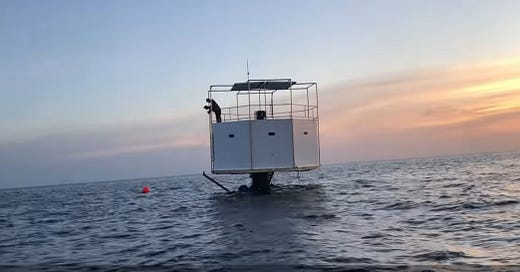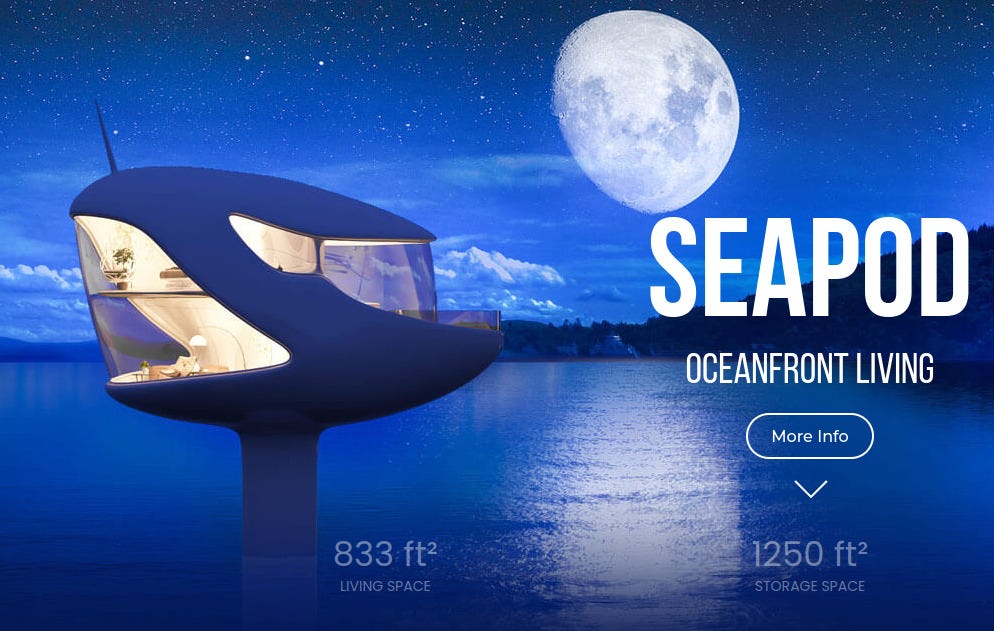Could we actually live happy lives away from land? Could we flourish on a “seafront” property on the oceans? Chad and Nadia, the Adam and Eve of seasteading, tried it. They are now facing the death penalty.
Dear friends and supporters of Daily Philosophy,
recently these articles have been a bit late in coming. This is mainly because the “Future of Mankind” premium series requires such an extensive amount of research that I can not always fit it into my normal work-week, along with all my other duties to job and family. I’m trying to bring you some truly fascinating content, and this does take a bit of time to create.
So please have a bit of patience — eventually, all the posts will arrive, they may just occasionally be a day or two late. Thanks!
This is a premium post, available only to supporters of Daily Philosophy. To be part of this exploration of our future and to support your favourite weekly dose of philosophy geekiness (broadly construed, as philosophers are fond of saying), please subscribe right here:
The men behind the dream
It’s easy to poke fun at the Seasteading Institute and their grandiose plans for thriving, independent nations, floating on the waves in international waters. In the real world, none of their projects has yet taken off in the way they were meant to.
Still, there is something there, a persistent question posed by these visionaries, whether perhaps we are all collectively misguided in our understanding of democracy, of the role of our states, of the value of our freedoms. Seasteading poses once again in human history the old questions: what is the role of the state, how should it relate to its subjects, and how can state power and state violence be justified? The answer, this time, is not presented in terms of a grand historical-philosophical narrative in the styles of Hegel and Marx, nor in terms of divine power invested in the sovereign; it is, rather plainly and fittingly for 21st century culture, given in the vocabulary of libertarian Silicon Valley entrepreneurialism.
In April 2019, Chad Elwartowski and his Thai partner, going by the name of Nadia Summergirl, set out on what they stylised then as a historic mission: to be the First Seasteaders, the Armstrong and Aldrin (or would it rather be Adam and Eve?) of a new social order.
With the help of Ocean Builders, a company that currently sells, as far as one can see, only 3D renderings of futuristic-looking houses, they planned to move into the first “Seapod.” This was planned to be part of a series of dozens, perhaps hundreds of “seafront properties,” to be anchored in the world’s oceans. Freedom-loving people would embrace the chance to escape from overbearing governments, unjust taxation laws and rampant paternalism and finally create the ideal society on the open ocean.
It is interesting to have a look at the biographies of the people who are at the head of the seasteading movement. Behind the Seasteading Institute, which we already met in the previous article in this series, is one Joe Quirk, author of a seasteading bible with the epic title: “Seasteading: How Floating Nations Will Restore the Environment, Enrich the Poor, Cure the Sick, and Liberate Humanity from Politicians.” Quirk has also written a couple of novels, a book on relationship advice based on evolutionary biology, and is a cherished guest on US right-wing, “libertarian” media.
The second brain behind the movement is Patri Friedman, grandson of economist Milton Friedman, high-level poker player, founder of Pronomos Capital, a company that aims to construct “tax-friendly” cities in developing countries with the support, again, of Silicon Valley billionaire Peter Thiel. Friedman has arranged to be cryonically preserved after his death. This surely says something about the man.
Keep reading with a 7-day free trial
Subscribe to Daily Philosophy to keep reading this post and get 7 days of free access to the full post archives.





